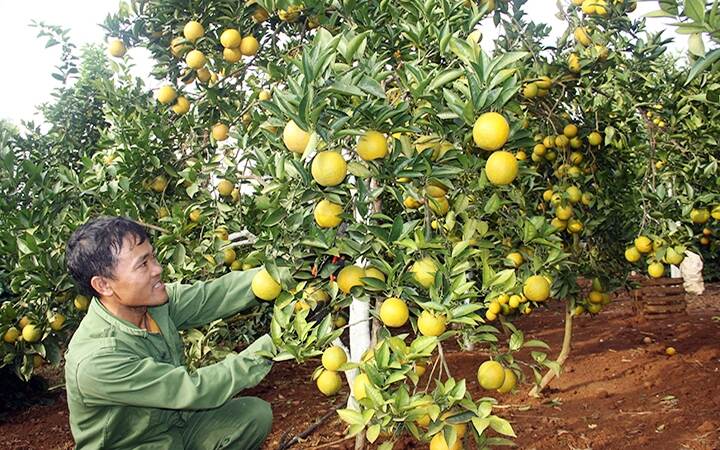Vietnamese produce heads for EU
The tariff cuts under the newly implemented EU-Vietnam Free Trade Agreement (EVFTA) are opening the doors for many Vietnamese agricultural products to enter the European Union market.
Making good use of EVFTA
Among the exports that have already begun benefitting from the terms of the new-generation trade deal are coffee, passion fruit, grapefruit, coconut, and dragon fruit. According to the Ministry of Agriculture and Rural Development (MARD), the Dong Giao Foodstuff Export Joint Stock Company and Vinh Hiep Company are planning to export passion fruit and coffee to the EU this month.
Farm produce is a key Vietnamese export that yielded US$41.3 billion in 2019. With a population of 508 million and a gross domestic product (GDP) of about US$18 trillion, the EU is a major, potential market for Vietnamese goods in general and agricultural products in particular.
Vietnamese agricultural products, including seafood, fruits, vegetables and rice, already have certain advantages in the EU despite being subject to high import taxes. With the deep tax cut commitments, EVFTA is expected to further boost Vietnam’s exports to that market.
The EU remains the largest importer of Vietnamese coffee, accounting for 37.9 percent of Vietnam’s total coffee export value in 2019. Vietnamese coffee is expected to enjoy better value in the EU in the near future due to the EU’s elimination of tariffs on all unroasted or roasted coffee products. Indeed, import duties will decrease from 7-11 to zero percent, while processed coffee will enjoy a preferential tariff of zero percent compared to a previous rate of 9-12 percent.
Moreover, the nation’s 39 geographical indications, including Buon Ma Thuot coffee, will be protected by the EU, which has offered the Vietnamese coffee industry an advantage when competing with rivals within the EU market.
Stringent requirements
With the EVFTA bringing about an array of changes, MARD Deputy Minister Le Quoc Doanh has urged the local coffee industry to meet the stringent requirements set by the EU market, particularly in relation to product quality and sustainable development.
Vietnamese fruit and vegetables have been able to enjoy a wealth of opportunities to penetrate the EU since August 1 based on the planned cuts of 94 percent of the total 547 tax lines imposed on these products. Along with tax incentives included in the EVFTA, Vietnamese fruits will be able to hold a competitive edge in the EU markets over strong competitors that have not signed an FTA with the EU, such as Thailand, China, Malaysia, and Indonesia.
In fact, Vietnam’s fruit and vegetable exports to the EU in August surged 25.2 percent to US$14.7 million from the previous month, marking an annual rise of six percent. In line with these figures, Vietnam has emerged as a leading exporter of passion fruit in the region, penetrating such discerning markets as France, Germany, and the Netherlands, along with markets outside of the EU such as the Republic of Korea (RoK) and Switzerland.
Economists are warning that EU tax cut commitments could also result in a series of new, stricter technical barriers.
Nguyen Thi Mai Linh, Head of the Agricultural, Forest and Aquatic Product Import, Export Division of the Agency of Foreign Trade under the Ministry of Industry and Trade said the EU is one of the most discerning markets in the world in terms of product quality, and strictly monitors illegal exploitation of natural resources and origin of goods traceability.
Professional production needed
Farmers are advised to cooperate with businesses to form central cultivation and farming areas in accordance with Vietnamese Good Agricultural Practices (VietGAP) and Global Good Agricultural Practices (GlobalGAP) in order to meet the EU’s quality standards.
They are also advised to pay due heed to post-harvest preservation, intensive processing, social responsibility, labor, the environment, and market research.
The experience of the Vietnam National Seed Group (Vinaseed) illustrates why businesses need to make changes and investments if they are to enjoy the terms of the pact. Vinaseed General Director Nguyen Quang Truong said although the EU provides a significant quota of up to 80,000 tonnes of rice for Vietnamese exporters, local firms must prepare carefully to meet strict requirements of the EU as one of the world’s most discerning markets.
Vinaseed built sustainable cultivation areas in compliance with VietGAP and a large, modern rice-refining mill while EVFTA was being negotiated. This allowed the company to export VJ Pearl Rice and RVT fragrant rice to the Netherlands and Czech Republic for a hitherto undreamed price of US$1,040 per tonne in July 2020.
In 2019, Vinaseed exported about 2,000 tonnes of rice worth US$2 million to the EU. The amount is expected to more than double to reach 5,000 tonnes in 2020 due to the far more competitive prices resulting from the zero tax rate.
Source: VEN
-------------------
DISCLAIMER
The above materials from the local newspapers are provided for informational purpose only. The content may include subjective parts and doesn't necessarily represents our own opinion. The Embassy therefore is not accountable for the objectiveness or accuracy of the content
